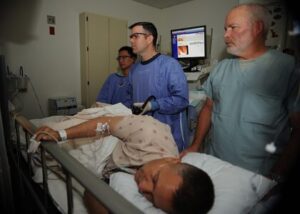
SAN DIEGO (April 5, 2011) Hospitalman Urian D. Thompson, left, Lt. Cmdr. Eric A. Lavery and Registered Nurse Steven Cherry review the monitor while Lavery uses a colonoscope on a patient during a colonoscopy at Naval Medical Center San Diego. (U.S. Navy photo by Mass Communication Specialist 2nd Class Chad A. Bascom/Released)
DURHAM, NC — Colonoscopies are not without risk, yet data are limited regarding the procedures’ long-term adverse effects.
A Durham, NC, VA Healthcare System-led study sought to describe adverse events during follow-up in a colonoscopy screening program after the baseline examination. With researchers from VAMCs in Portland, OR, and Perry Point, MD, as well as other academic institutions, they also examined factors associated with increased risk.
The study, which was published in Gastrointestinal Endoscopy, included 3,121 asymptomatic veterans 50 to 75 years who underwent screening colonoscopy between 1994 and 1997. For purposes of the research, periprocedure adverse events requiring significant intervention were defined as major events—other events were considered minor—and were tracked during follow-up for at least 10 years.1
Results indicated that, of 3,727 follow-up examinations in 1,983 participants, adverse events occurred in 105 examinations (2.8%) in 93 individuals. Of those, 22 were major and 87 were minor events.
“Incidence of major events (per 1,000 examinations) remained relatively stable over time, with 6.1 events at examination two, 4.8 at examination three, and 7.2 at examination four,” the authors pointed out. “Examinations with major events included one perforation, three GI bleeds requiring intervention, and 17 cardiopulmonary events.”
The authors also noted that a history of prior colonoscopic adverse events was associated with an increased risk of events (major or minor) during follow-up (OR, 2.7; 95% confidence interval, 1.6-4.6).
“Long-term programmatic screening and surveillance was safe, as major events were rare during follow-up.,” the researchers concluded. “However, serious cardiopulmonary events were the most common major events. These results highlight the need for detailed assessments of comorbid conditions during routine clinical practice, which could help inform individual decisions regarding the utility of ongoing colonoscopy follow-up.”
Another recent study in the Digestive and Liver Disease journal also looked at incidence, risk and protective factors of symptoms after colonoscopy. The Italian study involved researchers from Stonybrook University in New York.2
Its focus was on minor adverse events which may develop after colonoscopy, and the prospective study was conducted in 10 Italian hospitals. Defined as the main outcome was a cumulative score combining 10 gastrointestinal (GI) symptoms occurring the week following colonoscopy.
Researchers reported that, of 793 patients included in the analysis, 361 (45.5%) complained about the new onset of at least one GI symptom after the exam. One symptom was reported by 202 (25.5%), and two or more symptoms by 159 (20.1%). The authors said that newly developed symptoms more frequently reported were epigastric/abdominal bloating (32.2%), pain (17.3%), and dyspeptic symptoms (17.9%).
Symptoms were associated with:
- female sex (odds ratio [OR]=2.54),
- increasing number of symptoms developed during bowel preparation intake (OR=1.35) and
- somatic symptoms (OR=1.27).
“An inverse association was observed with better mood (OR=0.74),” the authors wrote. “A high-risk profile was identified, represented by women with bad mood and somatic symptoms (OR=8.81).”
The authors concluded that about half of the patients develop de novo GI symptoms following colonoscopy. “Improving bowel preparation tolerability may reduce the incidence of post-colonoscopy symptoms, especially in more vulnerable patients,” they suggested.
- Kobe EA, Sullivan BA, Qin X, Redding TS 4th, et. al. Longitudinal assessment of colonoscopy adverse events in the prospective Cooperative Studies Program no. 380 colorectal cancer screening and surveillance cohort. Gastrointest Endosc. 2022 Sep;96(3):553-562.e3. doi: 10.1016/j.gie.2022.04.1343. Epub 2022 May 7. PMID: 35533738.
- Collatuzzo G, Boffetta P, Radaelli F, Cadoni S, Hassan C, et. al. Incidence, risk and protective factors of symptoms after colonoscopy. Dig Liver Dis. 2022 Sep 22:S1590-8658(22)00651-X. doi: 10.1016/j.dld.2022.08.025. Epub ahead of print. PMID: 36154988.

